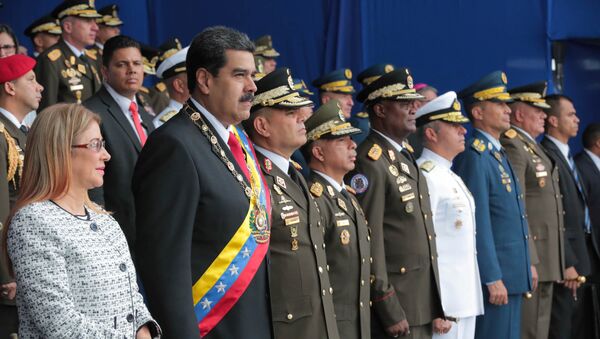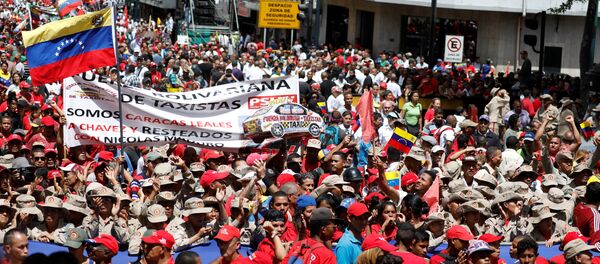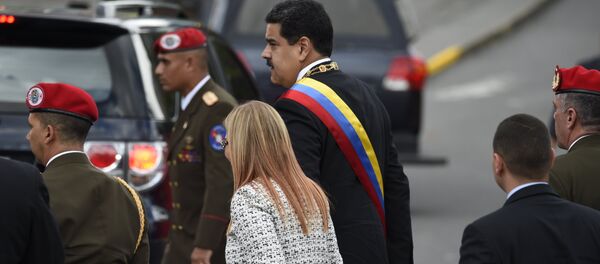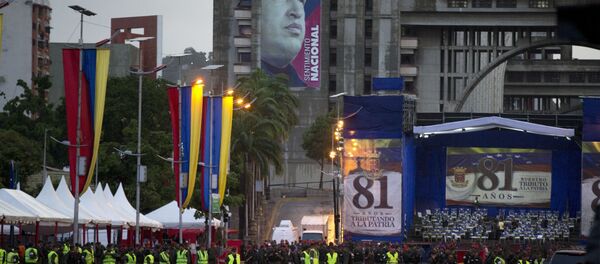Sputnik has discussed the possible perpetrators behind the events that took place in Caracas with Lazar Kheifets, lead researcher for the Latin American Institute of the Russian Academy of Sciences, professor of American Studies at School of International Relations of Saint Petersburg State University, and Konstantin Sapozhnikov, also known as Nil Nikandrov, a Russian journalist, Latin Americanist and author of the book “Hugo Chávez.”
Sputnik: After the assassination attempt, Venezuela’s Attorney General Tarek William Saab didn’t exclude the possibility that it had been planned outside of Venezuela. Who do you think may be behind this attempt? Are there any external forces that would benefit from what happened?
This scheme is very clear and in order to organize it, you need a very powerful infrastructure, trained personnel. Of course, drones may be sold freely on the market, but they are not sold full of powerful explosives, which is why this attack cannot be linked to radical opponents.
This attack was, most likely, very well planned and included a coordinator and professionals. The fact that all this happened during the celebrations of the 81st anniversary of the National Guard of Venezuela indicates that it was not a coincidence. Everything was very well prepared and intended for maximum effect, to prepare for a coup d’état. However, this coup isn’t going to take place in Venezuela because the Maduro government has the situation under control.
Lazar Kheifets: Maduro's government has caused discontent not only in Latin America. There are many international players who want to eliminate it through the use of force. I think Venezuela's attorney general, Tarek William Saab, was referring to the Venezuelan opposition that resides in the US city of Miami, Florida. Trying to guess the possible perpetrators of a terrorist attack is an unproductive method. We need absolutely precise facts here. The Flannel Soldiers, the group that claimed responsibility for the attack, has carried out similar attacks in the past. Their supposed leader, former Venezuelan police officer Óscar Pérez, recently died in a confrontation with the Venezuelan police.
I’m very cautious when dealing with any information that appears on the Internet. Can anyone who uploads data there be called an “organization”? The Flannel Soldiers may have perpetrated the attack on Maduro, but where is the evidence?
Sputnik: Do you think the US could be behind the attempt?
I think they counted on that. The fact that the Venezuelan government let that happen shows that there’s some complexity within the country’s security agencies. What happened is a signal for Maduro, he’ll respond robustly. I think the attack could have been committed from Colombia, who is also one of Venezuela’s main enemies.
The Americans are working through Colombia, it may be that Colombian specialists have also participated in this attack, but the United States would be the main organizer, inspirer, and financier of everything that happened.
Lazar Kheifets: We can make conclusions about the case, but it’s necessary to have proof. All the statements here require confirmation.
Sputnik: After the attack, Nicolás Maduro addressed the nation and accused the Colombian president of being behind the assassination attempt. Why do you think that such accusations were made? Could Santos have anything to do with the attack?
Konstantin Sapozhnikov: Since the early days of the Hugo Chávez government Caracas and Bogota have always had problems in their bilateral relations. I believe that in the current attack there is a large Colombian footprint. The Americans, of course, hide behind the Colombian executors, but everything is planned and organized in the CIA. I think there won’t be any consequences in Venezuela, apart from a crackdown. However, in this context, we can’t say that Maduro's regime is tough; it’s actually really weak.
The tense relations between Caracas and Bogotá are one of the explanations for Maduro's accusations against Santos. I think that the main problem of present-day Venezuela is that there currently is a strong opposition in Venezuela that is unable to reach an agreement with the authorities.
Sputnik: Many political scientists note that Venezuela is pursuing a policy independent of the US in South America and that it is in Russia's interests. Moreover, some experts believe that there is a comparison to be made between the attack on Maduro, the attempt on the Turkish president and the Turkish coup d’état attempt in 2016. Do you think these events have anything in common?
Konstantin Sapozhnikov believes that there’s a parallel between what happened in Turkey and in Venezuela. This may be due to the fact that both countries have a common enemy in the guise of the United States.
Konstantin Sapozhnikov: I believe that the US is currently trying to eliminate the supporters of the Bolivarian Revolution and progressive forces in South America. We can say that those forces that have counteracted the US for a long time are already separated and don’t share any solidarity. A strong blow was struck against Brazil, Ecuador, and Nicaragua, which is why it’s clear that a very powerful enemy with great resources and capabilities is acting in the region.
I think something similar could happen in Nicaragua. Ecuador is already defeated as President Lenin Moreno has changed everything that was created by his predecessor Rafael Correa.
They are all retreating and acting separately. I think the cause of these changes is linked to the US reaction to the fact that Russia had launched a powerful offensive in the region. We can expect anything from them.
Lazar Kheifets: If the events are similar, it doesn’t mean they are interdependent and planned in one center. At present, most of the oil that Venezuela sells abroad goes to the US. It’s also a well-known fact that Russia maintains close economic ties with Venezuela. Russia’s Rosneft has shown great interest in the exploration of Venezuelan oil.
However, it’s not necessarily true that the development of economic relations should always lead to conflicts. I don’t like the approach that turns economic competition into a global confrontation leading to a global confrontation implemented by force.





